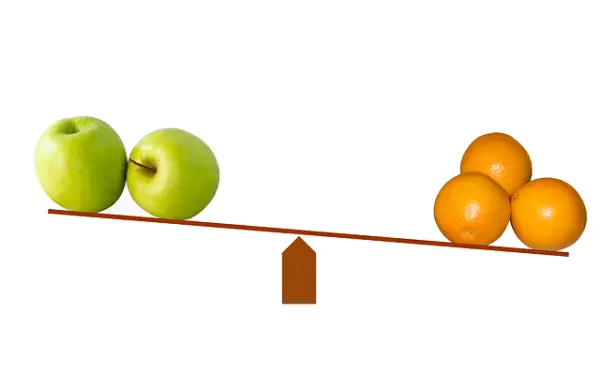Based on the same topic you are asked to give your speech in Part 2 of the Speaking test, you will be asked general questions in Part 3. While many IELTS Speaking Part 3 question types will ask you to provide reasons for your opinions or to list facts, there are three other ways the questions could be formulated.
First, you may be asked to compare and contrast between two things. For example: How is village life different from city life?
Second, sometimes you have to comment on the changes that have happened from the past till present. For example: How has the way the media reports news changed in the last 20 years?
Third, you may also be asked to predict the future. For example: How do you think homes in the future will be decorated?
Let us look at each IELTS Speaking Part 3 question types in turn.
IELTS Speaking Part 3 question types: Comparison

In the Speaking test, you might be asked to talk about the differences between two things.
In such cases, you have to first come up with separate points for the two things, and then use discourse markers to distinguish them. For an instance:
What is the difference between staying in a hotel and staying in an outdoor camp?
| Staying in a hotel | Staying in an outdoor camp |
|---|---|
| 1. In a hotel, you get to sleep in a comfortable bed. | 1. In a tent, you have to use sleeping bags which are uneasy. |
| 2. Hotels provide safety from the weather and animals. | 2. Camping is adventurous because you are in the nature where you have to fend for yourself. |
Once you have come up with points like above, you can use words which are used to contrast ideas.
Answer: In my opinion, in a hotel, you get to sleep in a comfortable bed. On the other hand, in a tent, you have to use sleeping bags which are uneasy. Similarly, hotels provide safety from the weather and animals. However, camping is adventurous because you are in the nature where you have to fend for yourself.
In the above example, the phrase “On the other hand” and the word “However” are discourse markers which can be used to show the differences between two things. Some common examples of such words and phrases are as follows:
- In contrast
- Meanwhile
- Whereas
- By comparison
- Conversely
- On the contrary
- Nevertheless
- Alternatively
- Nonetheless
- On the other hand
- However
There are also several types of complex sentences which can be used to state opposite ideas. For example:
Although in a hotel, you get to sleep in a comfortable bed, in a tent, you have to use sleeping bags which are uneasy.
In spite of the fact that hotels provide safety from the weather and animals, camping is adventurous because you are in the nature where you have to fend for yourself.
The following words or phrase can be used to form complex sentences for the purpose of differentiating:
- Though
- Even though
- Although
- In spite of
- Despite of
To learn more about complex sentences, click here ».
You can also use comparative words to compare between things. Adjectives have comparative forms like in the table below:
| Adjective | Comparative |
|---|---|
| big | bigger |
| easy | easier |
| good | better |
| bad | worse |
| much | more |
| little | less |
Examples:
Oceans are bigger than seas.
Typing on a computer is easier compared to typing on a typewriter.
Cities have better infrastucture than villages.
Snake bites are worse in comparison to bee stings.
It is more expensive to travel to foreign countries than travelling within you own country.
Reading a book is less exciting than watching a play on stage.
IELTS Speaking Part 3 question types: Past and present

Often in IELTS Speaking Part 3, you will be asked to express your views on how things have progressed from a point of time in the past to the present scenario.
For such questions, follow the format below:
| 3-part Format | Grammatical structure |
|---|---|
| 1. Say about the past in the simple past tense | subject + verb 2 + object subject + used to + verb 1 + object |
| 2. Describe the change in the present perfect tense | subject + has/have + verb 3 + object |
| 3. Say about the present in the simple present tense | subject + verb 1 / verb 5 + object |
The five verb forms:
| verb 1 (base) | verb 2 (past) | verb 3 (past participle) | verb 4 (present participle) | verb 5 (third person singular) |
|---|---|---|---|---|
| dance | danced | danced | dancing | dances |
| copy | copied | copied | copying | copies |
| go | went | gone | going | goes |
| sing | sang | sung | singing | sings |
| drive | drove | driven | driving | drives |
How are movies of today different from movies of the last century?
1. Say about the past in the simple past tense: In the past, filmmakers used to rely on dangerous practical effects for action scenes in movies using stuntmen and equipment like harnesses.
2. Describe the change in the present perfect tense: But in the 21st century, computer graphics have improved to such a degree that realistic scenes can be created for films safely by using computers.
3. Say about the present in the simple present tense: Therefore, most movies these days resort to computer-generated imagery to create stunning and fantastic scenes like in the Avengers movie.
So, follow the 3-part format to answer questions that ask you to compare the past with the present. Be careful to use the correct grammatical structure and in three sentences you can provide a coherent response.
One more example:
Do children of today spend their free time in the same way you used to?
As far as I remember, when I was a child, I played board games like Ludo, Scrabble, and Chess in leisure time. In the meantime, cell phones and the internet have become widespread. So, children now play games like Pubg, Angry Birds, and Among Us on their phones.
IELTS Speaking Part 3 question types: Speculating about the future

In the Speaking test, the examiner might want to know about your predictions for the future. Since nobody knows what is going to happen, you can make wild guesses but you have provide reasons for your guess as well.
Just like the 3-part format for comparing the past with the present, the following is a format for comparing the present with the future:
| 3-part Format | Grammatical structure |
|---|---|
| 1. Say about the present in the simple present tense | subject + verb 1 / verb 5 + object |
| 2. Describe the change in the future perfect tense | subject + will have + verb 3 + object |
| 3. Say about the future in the simple future tense | subject + will + verb 1 + object subject + is/am/are + going to + verb 1 + object |
How will the family change in the future?
1. Say about the present in the simple present tense: Currently, a family typically includes a father, a mother, and a couple of children.
2. Describe the change in the future perfect tense: As the concept of same-sex marriages is getting hold and gaining legal status in many countries, a lot of homosexual couples will have married and adopted children in the future.
3. Say about the future in the simple future tense: I expect that many families in the coming days will consist of two fathers and children or two mothers and children.
What types of vehicles will people use for transportation in the future?
These days, while most people drive personal cars to move about, self-driving vehicles are becoming commonplace in some parts of the world. In the next two to three decades, automotive technology will have advanced exponentially. I imagine that in the next thirty years, we are going to have self-piloting flying cars which will revolutionize transportation.
Try to use the following discourse markers when talking about the future:
- It might be that
- I suppose
- I guess
- I imagine that
- I expect that
- I think that
- Maybe
- Perhaps
You may also like:
IELTS Speaking Assessment Criteria